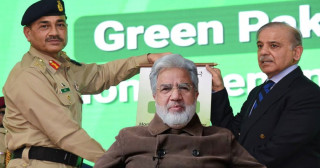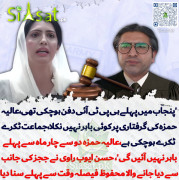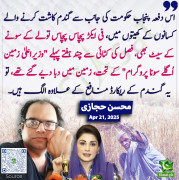Alsadeeqalameen
Politcal Worker (100+ posts)
Prophet Mohammed (SAW) when he settled in Medina with his followers was to constitute a city-state in which Muslims, Jews, Christians, pagan Arabs all entered into a social contract. The constitutional law of the first Muslim state succeeded in was a confederacy as a sequence of the multiplicity of the population groups which meant: To Muslims their religion and to the Jews their religion; to Christians their religion, and there would be benevolence and justice to all. This also meant that the non-Muslims possessed the right to vote in the election of the head of the state as they elected Prophet Mohammed (SAW) as their political head. In Islamic states, non-Muslim communities had always enjoyed a judicial autonomy, not only for personal status but also for all affairs of life including civil, penal and others. Judicial powers were delegated to Christian priests and the Jewish hakham in the reign of many caliphs. In the time of prophet Mohammed, the Jews of Medina had their synagogue and educational institute and in the treaty with the Christians of Narjan, Prophet gave a guarantee not only for the security of person and property of the inhabitants but left the nomination of bishops and priests to the Christian community itself. In an Islamic state, non-Muslims constitute a protected community and it is therefore the duty of the governments to protect their legitimate interests and only thing that they are not permitted is to interfere in the Islamic jurisprudence.
The spirit finds its opportunity in the natural, the material and even in the secular; there is no such thing as a profane in the world. As Prophet Mohammed (SAW) so beautifully put it: The Whole world is a mosque. The available record show that Prophet Mohammed(SAW) was always especially tolerant of Christians and in 628 in Median, he granted a Charter to the Monastery of ST. Catherine, guaranteeing the safety of their persons , houses and in places of worship. They were not to be converted to Islam by force as conversion is forbidden and was detested by the Prophet. Christian women married to Muslims could follow their own religion and Muslims were encouraged to help in the repair of their churches. The Jews, however received a different treatment since they had always conspired, created insidious troubles (fitna) and sided with the Querish of Mecca and supported them in contravention of earlier treaty obligation with Prophet (pubh) in attacking Muslims settled in Medina. These Jews were deeply distrusted and strongly resented for their inherent hatred and treachery against Islam and Muslims. But they were free In the 7th century because of Islams magnanimity and equity in justice to all its citizens of the expanding caliphate, Nestorians and Monophysite Christians of Egypt and Syria embraced Islam because of the prejudicial and racist treatment of the treatment of the Romans.
The Qur'an, in fact, directly encourages pluralism in the ayat 5:48. It clearly states that every people have their own law and a way i.e. every nation is unique in its way of life, its rules etc. It also says that if Allah had pleased, He would have created all human beings a single people but He did not do so in order to test them (whether they can live in harmony with each other despite their differences in laws and way of life). Thus it is clear assertion of pluralism. One must respect the others faith and live in harmony with him/her. For every age there are some keys which help us understand the scripture in our own age. Also, a commentator should have a vision of society and this vision evolves from ones own social situation. Allah's creative power cannot be treated as static any way. The Qur'an also refers to His dynamism when it states "....every day He manifests Himself in yet another (wondrous) way. Which, then, of your Sustainer's powers can you disavow?" (29:55). This Allah manifests Himself every day in new state (sha'n). And the word yaum literally means day but figuratively it can also mean a whole epoch, a period. Taking the word yaum in this sense, the verse will mean Allah manifests His Glories in new ways from period to period, from epoch to epoch.
Islam has progressive traditions and Islamic civilization has in the past proved capable of extraordinary feats of tolerance. Under the Muslims, medieval Spain became a haven for diverse religions and sects, and the allegation by some that Islamic civilization is inherently less capable of tolerance is absurd. Magnanimity is very much admired by Muslims and it is considered a sin if we ill-treat or harm an enemy at our mercy; it is our religious and moral duty to protect him from all harm. In Islamic civilization and rules, Jews, Christians, Zoroastrians, Hindus and other people of various beliefs enjoyed religious freedom and equal rights. This reflected the teachings of the Quran, which is pluralistic scripture and affirmation of others' traditions. As far as the secular view, Ottomans were considered history's longest-lasting major dynasty; their long reign must have had some relation to their ability to rule a multi-faith empire when Europe was hanging different varieties of Christian believers. People of different faiths were never forced to accept Islam and we can see the evidence: in India 85% of the population still practice Hinduism and over 95% of the Europeans are Christian, 18 million Coptic Christian still live in Egypt despite ruled by the Muslims for long periods.
There are rationalists and atheists who consider religion and secularism quite contrary to each other. For them the two are quite incompatible. Secularism is a non-religious, if not altogether anti-religious philosophy. A secular political philosophy should have nothing to do with any religious tenets or doctrines. A secular state then would not take any religious beliefs or practices into account while legislating on any issue and in some extreme cases even citizens would not be free to have religious faith and declare it and practice it publicly. Religion, in other words, would be almost a taboo in such a political set up. The former Soviet and Chinese states came close to this model. Then there is western liberal secular model where religion is not a taboo but is not a basic factor as far as state affairs are concerned. State affairs are conducted quite independently of any religious considerations. In the U.K. too, where Anglican Christianity continues to be state religion and the king or queen of England is considered head of the Anglican Church, religion plays hardly any role in the matters of state. All state legislations are quite independent of the tenets of the Anglican Church. The Church cannot oppose any law passed by the House of Commons and approved by the House of Lords. In other western countries too positions are more or less similar. The state remains quite independent of the church. In fact church and state have totally independent domains and do not interfere in each others sphere. This western model comes closest to the political philosophy of secularism. The Islamic world has its own features and uniqueness. When we deal with the question of Islam and secularism we have to keep this in mind that the Islamic world is also not homogenised one. One comes across fundamental differences in Islamic countries from Algeria to Indonesia though all of them follow religion of Islam. Commonality of religion does not necessarily mean commonality of social or political traditions. These traditions are as different as their societies and social realities.
The religion (Deen) and law (Shariah) are the two components of Islam: out of which Deen is absolute and unchangeable and has to be followed in its entirety but the Shariah can on occasions adjust itself to changing times and circumstances but its application must never dither from the Islamic parameters. Sharia is flexible and not rigid as portrayed by anti-Islamic Western media and also because some silly mullahs think so too. Take for instance punishments: Islam does not only insist on awarding punishment to criminals for various offences but its aim is to cultivate and encourage a sort of atmosphere where no crimes are committed and emphasises on eliminating root causes so that crimes do no take place. In the domain of judiciary, equality of all men and women is law, in which even the head of state is not exempt from his subjects and is answerable to them. Islam envisages religion as not just a part of life but as the whole of it. In fact, aI-Islam or al-din sees itself as life itself and it incorporates what we do, what we make, what we think, what we feel as well as addresses the question of where we come from and where we are go after this life. So, please do not make Islam difficult to understand; a burden upon yourself but make it easier for the non-Muslims to live in. In an Islamic Nizam, Hindus, Sikhs, Christians, Parsis and other religious minorities have as many rights as their next door Muslim neighbours but they can not participate in the Islamic jurisprudence.
The spirit finds its opportunity in the natural, the material and even in the secular; there is no such thing as a profane in the world. As Prophet Mohammed (SAW) so beautifully put it: The Whole world is a mosque. The available record show that Prophet Mohammed(SAW) was always especially tolerant of Christians and in 628 in Median, he granted a Charter to the Monastery of ST. Catherine, guaranteeing the safety of their persons , houses and in places of worship. They were not to be converted to Islam by force as conversion is forbidden and was detested by the Prophet. Christian women married to Muslims could follow their own religion and Muslims were encouraged to help in the repair of their churches. The Jews, however received a different treatment since they had always conspired, created insidious troubles (fitna) and sided with the Querish of Mecca and supported them in contravention of earlier treaty obligation with Prophet (pubh) in attacking Muslims settled in Medina. These Jews were deeply distrusted and strongly resented for their inherent hatred and treachery against Islam and Muslims. But they were free In the 7th century because of Islams magnanimity and equity in justice to all its citizens of the expanding caliphate, Nestorians and Monophysite Christians of Egypt and Syria embraced Islam because of the prejudicial and racist treatment of the treatment of the Romans.
The Qur'an, in fact, directly encourages pluralism in the ayat 5:48. It clearly states that every people have their own law and a way i.e. every nation is unique in its way of life, its rules etc. It also says that if Allah had pleased, He would have created all human beings a single people but He did not do so in order to test them (whether they can live in harmony with each other despite their differences in laws and way of life). Thus it is clear assertion of pluralism. One must respect the others faith and live in harmony with him/her. For every age there are some keys which help us understand the scripture in our own age. Also, a commentator should have a vision of society and this vision evolves from ones own social situation. Allah's creative power cannot be treated as static any way. The Qur'an also refers to His dynamism when it states "....every day He manifests Himself in yet another (wondrous) way. Which, then, of your Sustainer's powers can you disavow?" (29:55). This Allah manifests Himself every day in new state (sha'n). And the word yaum literally means day but figuratively it can also mean a whole epoch, a period. Taking the word yaum in this sense, the verse will mean Allah manifests His Glories in new ways from period to period, from epoch to epoch.
Islam has progressive traditions and Islamic civilization has in the past proved capable of extraordinary feats of tolerance. Under the Muslims, medieval Spain became a haven for diverse religions and sects, and the allegation by some that Islamic civilization is inherently less capable of tolerance is absurd. Magnanimity is very much admired by Muslims and it is considered a sin if we ill-treat or harm an enemy at our mercy; it is our religious and moral duty to protect him from all harm. In Islamic civilization and rules, Jews, Christians, Zoroastrians, Hindus and other people of various beliefs enjoyed religious freedom and equal rights. This reflected the teachings of the Quran, which is pluralistic scripture and affirmation of others' traditions. As far as the secular view, Ottomans were considered history's longest-lasting major dynasty; their long reign must have had some relation to their ability to rule a multi-faith empire when Europe was hanging different varieties of Christian believers. People of different faiths were never forced to accept Islam and we can see the evidence: in India 85% of the population still practice Hinduism and over 95% of the Europeans are Christian, 18 million Coptic Christian still live in Egypt despite ruled by the Muslims for long periods.
There are rationalists and atheists who consider religion and secularism quite contrary to each other. For them the two are quite incompatible. Secularism is a non-religious, if not altogether anti-religious philosophy. A secular political philosophy should have nothing to do with any religious tenets or doctrines. A secular state then would not take any religious beliefs or practices into account while legislating on any issue and in some extreme cases even citizens would not be free to have religious faith and declare it and practice it publicly. Religion, in other words, would be almost a taboo in such a political set up. The former Soviet and Chinese states came close to this model. Then there is western liberal secular model where religion is not a taboo but is not a basic factor as far as state affairs are concerned. State affairs are conducted quite independently of any religious considerations. In the U.K. too, where Anglican Christianity continues to be state religion and the king or queen of England is considered head of the Anglican Church, religion plays hardly any role in the matters of state. All state legislations are quite independent of the tenets of the Anglican Church. The Church cannot oppose any law passed by the House of Commons and approved by the House of Lords. In other western countries too positions are more or less similar. The state remains quite independent of the church. In fact church and state have totally independent domains and do not interfere in each others sphere. This western model comes closest to the political philosophy of secularism. The Islamic world has its own features and uniqueness. When we deal with the question of Islam and secularism we have to keep this in mind that the Islamic world is also not homogenised one. One comes across fundamental differences in Islamic countries from Algeria to Indonesia though all of them follow religion of Islam. Commonality of religion does not necessarily mean commonality of social or political traditions. These traditions are as different as their societies and social realities.
The religion (Deen) and law (Shariah) are the two components of Islam: out of which Deen is absolute and unchangeable and has to be followed in its entirety but the Shariah can on occasions adjust itself to changing times and circumstances but its application must never dither from the Islamic parameters. Sharia is flexible and not rigid as portrayed by anti-Islamic Western media and also because some silly mullahs think so too. Take for instance punishments: Islam does not only insist on awarding punishment to criminals for various offences but its aim is to cultivate and encourage a sort of atmosphere where no crimes are committed and emphasises on eliminating root causes so that crimes do no take place. In the domain of judiciary, equality of all men and women is law, in which even the head of state is not exempt from his subjects and is answerable to them. Islam envisages religion as not just a part of life but as the whole of it. In fact, aI-Islam or al-din sees itself as life itself and it incorporates what we do, what we make, what we think, what we feel as well as addresses the question of where we come from and where we are go after this life. So, please do not make Islam difficult to understand; a burden upon yourself but make it easier for the non-Muslims to live in. In an Islamic Nizam, Hindus, Sikhs, Christians, Parsis and other religious minorities have as many rights as their next door Muslim neighbours but they can not participate in the Islamic jurisprudence.

























